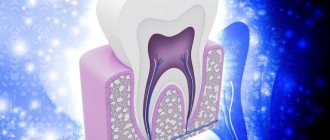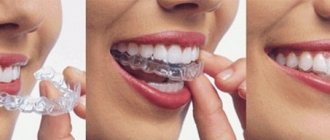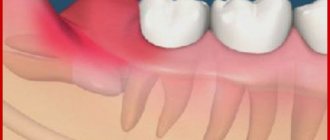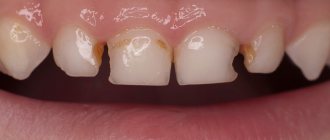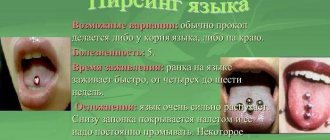Manifestations Causes What to do if an odor appears?
How to get rid of it? Prevention Everyone experiences discomfort in the mouth after sleep, but after hygienic cleaning it disappears. But sometimes, after 1-2 hours, your breath becomes stale again. Persistent bad breath is called halitosis
. This is not just an aesthetic problem. Often, bad breath indicates dysfunction of certain organs and systems. It is not easy to identify halitosis on your own. The occurrence of an unpleasant odor is usually attributed to food, alcohol or smoking.
The easiest way to identify halitosis yourself is to bend your palm, breathe into it a little and then bring it to your nose. You can use dental floss and smell it after cleaning the spaces between your teeth. Or wipe your tongue, the inside of your cheek with a cotton pad and bring it to your nose. If any method gives a positive answer, you should seek help from a dentist.
Masking a bad odor with mints or chewing gum is not the answer. Halitosis is not an independent disease. This is a symptom indicating another pathology. It is not necessarily associated with oral health - the cause is various conditions that contribute to the proliferation of bacterial microflora. Highly qualified dentists of the RUTT clinic network in Moscow, modern equipment, will help to quickly determine the cause of the symptom and finally remove bad breath.
Swelling
Swelling may appear after gum injury. In this case, it is localized, extends only to the site of the bruise, may hurt a little, but in general it goes away quickly. If after an injury the swelling persists for a long time, intensifies, the pain becomes acute or throbbing, you need to consult a doctor.
In other cases, swelling of the gums is a symptom of inflammation. It is accompanied by pain, bleeding may appear, the color of the mucous membrane changes (it becomes darker or acquires a bright red tint). Such swelling may accompany gingivitis or periodontitis.
What to pay attention to
If any problems arise, you should contact your dentist as soon as possible. We recommend coming for a consultation as soon as you notice:
- The appearance of an unpleasant putrid odor.
- It feels like something is stuck under the crown.
- Change in gum color, swelling, swelling, pain.
- The appearance of blood while brushing your teeth.
- Darkening of the abutment tooth.
When a tooth is prepared for a crown, the nerve endings are removed. Therefore, secondary caries passes painlessly. It can only be noticed by indirect signs. But these symptoms indicate that some pathological process is developing in the oral cavity. You should see a doctor immediately. Delaying a visit to the clinic will cause the inflammatory process to develop quickly.
Untreated inflammation under the crown is one of the most common causes of loss of an abutment tooth. A heavily damaged support unit cannot always be preserved. Most likely it will have to be removed and then re-prosthetics done.
Causes of halitosis
All factors contributing to the occurrence of halitosis are divided into 2 groups:
- Local
– related to the condition of the oral cavity; - General
– related to the health of internal organs and systems.
In most cases, the appearance of halitosis is due to dental reasons. Bad breath appears due to anaerobic bacteria living in dental plaque and tartar. These microorganisms release various volatile compounds (hydrogen sulfide, dimethyl sulfide, ammonia, trimethylamine, etc.) that affect the freshness of breath.
Dental causes of bad breath
To the main reasons
Local halitosis includes:
- poor oral hygiene, accumulation of bacterial plaque, formation of hard dental plaque;
- caries and its complications;
- stomatitis, periodontitis, periodontal disease;
- glossitis, gingivitis, cheilitis, pulpitis;
- alveolitis, peri-implantitis, pericoronaritis, etc.
Local halitosis may be accompanied by the following symptoms
:
- looseness, swelling, bleeding gums, formation of gum pockets;
- tooth mobility;
- white, yellow coating on the oral mucosa;
- an increase in the volume of gingival papillae between the teeth;
- pain, swelling of the oral mucosa.
Bad breath in an adult can occur when wearing braces or dentures. This happens if the structure is installed incorrectly, food debris accumulates under it, and insufficient care is provided.
Bad breath can occur in both adults and children. The causes of halitosis in children are the same as in adults. Therefore, treatment should begin with a visit to the dentist. Often, to eliminate bad breath from a child, it is enough to teach him how to brush his teeth correctly and cure caries.
Non-dental causes of halitosis
In practice, it often happens that to eliminate bad odor it is enough to just remove plaque and tartar. Dental deposits contain a large number of pathogenic microorganisms, which not only provoke bad breath, but also cause inflammation of the mucous membrane and periodontal tissue. However, sometimes a bad odor has a more complex cause.
Result of tartar cleaning
General halitosis is caused by the following reasons:
- diseases of the gastrointestinal tract (gastroesophageal reflux, ulcerative disease of the stomach and duodenum, gastric carcinoma);
- ENT pathologies (sinusitis, sinusitis, rhinitis, foreign body in the nasal passages);
- diseases of the respiratory system (bronchitis, pneumonia, bronchiectasis, etc.);
- systemic diseases (hepatitis, liver cirrhosis, renal failure, leukemia);
- endocrine disorders (metabolic syndrome, diabetes mellitus, endemic goiter).
Bad breath will not disappear if you mask it with aromatic flavors of chewing gum or dental rinses. Initially, it is necessary to identify and eliminate the root cause of the unpleasant manifestation.
Additional symptoms will help the doctor understand why your breath smells. If the dentist is sure that the problem that has arisen is not related to the health of the oral cavity, you should consult with a therapist. Based on the medical history and clinical manifestations, the therapist will refer you to a specialist - an otorhinolaryngologist, gastroenterologist, nephrologist, psychotherapist, endocrinologist, for an accurate diagnosis and effective treatment.
What to do if you have a bad breath
The principles of treating halitosis are based on the causes of its occurrence. If the source of bad breath is a source of infection or a carious cavity, the unpleasant symptom will disappear after a course of professional hygiene with the removal of supragingival and subgingival dental plaque, treatment of caries, removal of decayed teeth that cannot be restored by orthopedic methods.
Antiseptic solutions will help deal with the problem faster. Rinsing your mouth with an antiseptic inhibits the growth of pathogenic microorganisms and prevents relapse of inflammation. The rinse is selected based on the dentist’s recommendations. The doctor will decide how to treat bad breath after a comprehensive diagnosis.
If the root cause of halitosis is an inflammatory-infectious process of the gums and oral mucosa, local treatment with antibacterial, antiviral, and antifungal drugs is prescribed. Combined products contain components to relieve itching, redness, burning, pain, and eliminate unpleasant odor. In case of severe inflammation, systemic antibiotic therapy, immunomodulators, and vitamins are prescribed. In situations where halitosis is caused by installed orthodontic or orthopedic structures, measures are taken to correct and replace them. Or they select an alternative method of prosthetics and bite correction.
How to treat unpleasant odor from under a crown
At the initial stage of treatment, the doctor must identify the reasons for the appearance of a bad odor from under the dental structure. Diagnostics includes:
- Examination of the oral cavity.
- X-ray of the tooth, according to indications - maxillary sinuses, orthopantomogram.
- Development of a patient management plan.
Based on the examination results, the doctor will suggest therapeutic or surgical treatment. You may need to consult a periodontist or otolaryngologist.
What the dentist can offer:
- Treatment of caries, sanitation of dental canals with their subsequent filling.
- In case of inflammation of the gums, the doctor will evaluate the quality of the installation of the prosthesis and the depth of the periodontal pockets. Their cleaning, rinsing with antibacterial solutions, and applications with medications are indicated. In severe cases, the doctor will prescribe antibiotic injections. After stopping the inflammatory process, physiotherapy is indicated for the mineralization of bone tissue.
- Installation of a new prosthesis - if the old crown cannot be restored, was installed with errors, or the patient has developed an allergy to the materials from which it is made.
- If tooth root cysts are identified, then their removal is indicated. Access is through an incision in the gum. The tooth can be saved.
- If perforation of the maxillary sinus is detected, the implant is removed. The sinuses are sanitized by an otolaryngologist. After stopping the inflammatory process, the bone tissue is restored, the bottom of the maxillary sinus is raised and a new implant is installed.
And most importantly! If a medical error has been made, self-respecting clinics provide treatment under a guarantee. Implantation, installation of crowns, dental structures are expensive services. And if the clinic does not provide a guarantee for its work, then you need to change the medical institution.
Additionally, conservative therapy is indicated - rinsing with decoctions of medicinal herbs, antibacterial drugs, training in the rules of oral care.
Three ways to check if you have bad breath
- Lick your wrist and smell it. This is what the front part of the tongue smells like, and at the root of the tongue the “aroma” is usually much more intense.
- Take a spoon, lick it a few times and smell it. There will be saliva on it and it will smell just like your breath.
- Exhale into the mirror and immediately inhale deeply through your nose. The smell that you smelled is felt by others when communicating with you.
If your breath is bad, contact your dentist for help. Your doctor will help you find out the cause of bad breath and get rid of it.
When a visit to the dentist should be urgent
The appearance of an unpleasant odor from under dental structures is accompanied by additional symptoms. There is no need to delay your visit to the doctor.
Reasons to urgently consult a doctor:
- Mobility, complete or partial destruction of the crown.
- Pain – sharp, dull, aching, shooting, when biting, when brushing teeth, when exposed to thermal irritants.
- Change in gum color - hyperemia, cyanosis, swelling.
- Suppuration from under the crown, gums, formation of fistula tracts.
- Recurrent episodes of sinusitis.
- Numbness of the tongue, strange taste in the mouth.
- General weakness, fever, enlarged lymph nodes.
- Formation of a galvanic couple due to different prosthetic materials. Accompanied by a metallic taste in the mouth and electrical impulses.
But even if nothing besides amber bothers you, then consult a dentist. A bad odor indicates the proliferation of bacterial flora. And the appearance of pain or pus is a matter of time.
How to get rid of bad breath
Halitosis is not masked by the scent of bubble gum or mint candy. To get rid of an unpleasant odor, you need to reduce the number of bacteria. This can be done only by removing tartar and plaque.
How to eliminate bad breath
- Use floss and irrigator to clean the interdental spaces.
- Use a special brush to clean your tongue, paying special attention to its root.
- Drink at least 2 liters of clean water per day.
- Visit your dentist regularly.
- Once every six months, undergo a professional hygiene procedure.
If you urgently need to freshen your breath, you can use special rinses or infusions of peppermint, string and cumin. There are also aerosol fresheners and special lollipops. True, the effect will be temporary and the smell will return very quickly.
How to solve this problem?
At home, this situation can only be dealt with if the cause of the unpleasant odor is poor oral hygiene. Experts recommend using a medium-hard toothbrush, toothpaste, floss, irrigator and refreshing mouthwash. If the problem is not solved in this way, all that remains is to visit a dentist.
When you visit a specialist, you will most likely have to remove the crown. This way, the doctor will be able to understand what exactly caused the bad odor. If caries is detected, it is eliminated. To re-fix the crown, better cement compounds are used. If the cause of the smell was a medical mistake, the idea is that the work should be redone completely free of charge.
Signs of tooth decay under the crown
Tooth decay under the crown is a dangerous situation for the body. The process is accompanied by the proliferation of pathogenic flora. With the blood flow it enters all organs and systems.
Symptoms of tooth decay under a denture:
- halitosis – the appearance of an unpleasant odor;
- mobility of the dental structure;
- darkening of a molar, incisor or canine;
- taste of pus in the mouth;
- receding gums, exposing the neck of the tooth;
- tissue hyperemia, bleeding from the gums;
- pain when biting, temperature change.
Do not delay in seeing a doctor. The sooner you start treatment, the greater the chances of saving the tooth under the crown and preventing the development of complications. Price list with orthopedic services – follow the link.



